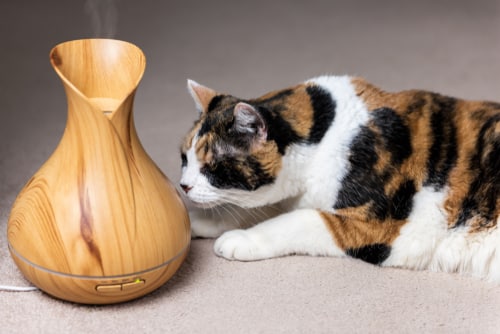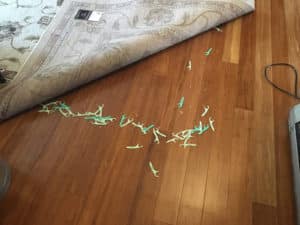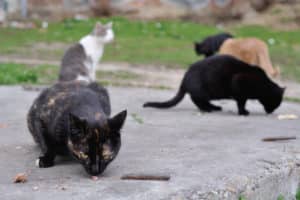Are Essential Oils Really Dangerous for My Cat?
Essential oils have risen in popularity over the past decade, with proponents of the oily life citing benefits such as improved sleep, pain management, antibacterial effects, and more. Essential oils are now used in everything from organic cleaning supplies to food preparation and beauty products. However, the same oils that have numerous benefits for humans may actually be harmful for cats.
Before you become alarmed and throw out all your expensive and helpful essential oils, pause and take a deep breath. Only some oils are harmful and only under certain circumstances. By knowing the risks and taking a few simple safety precautions, you can continue to use and benefit from your essential oils without hurting your feline friends.
What are Essential Oils?
Essential oils are aromatic compounds that occur naturally in various parts of plant, including the bark, stems, roots, flowers, and seeds. These oils are what give plants their signature fragrances, attract bees, repel fungus and bugs, and make some plants antimicrobial. In other words, essential oils play a big role in the plant or flower’s life by protecting it from harm and promoting its health and reproduction.
These aromatic compounds can also be distilled down for our use. They are highly volatile, which means the molecules change from liquid to gas quickly when exposed to the air. This property is what allows essential oils to be diffused through the air and absorbed through the skin and into the bloodstream.
There are thousands of plant oils that we use commercially for cooking, cleaning, skin care, and other applications. What makes essential oils different is their concentration and, therefore, their potency. Most essential oils must be diluted with an inactive carrier oil when used topically, for example.

Are Essential Oils Dangerous to Cats?
The same insect and fungal-repelling properties that protect the plant from harmful bugs and other critters can be dangerous for cats, especially at the high concentrations found in essential oils. Cats are more susceptible than dogs to these compounds because of the way their livers function.
Essential oils and other potentially harmful compounds get filtered through the liver. Feline livers lack the enzymes needed to process things like certain plants, essential oils derived from those plants, caffeine, household medicines, and chocolate. In other words, compounds that are helpful to humans can be toxic to your cat.
Young kittens and older cats with weak livers are at even greater risk, so be especially careful using essential oils around them.
Which Essential Oils Can Harm My Cat?
Fortunately, the list of oils that can cause your cat harm isn’t that long. Here are all the essential oils that could become harmful to your cat:
- Basil
- Birch
- Cinnamon
- Clove
- Citrus Oils (High in d-limonene)
- Fennel
- Melaleuca (Tea Tree Oil)
- Oregano
- Peppermint
- Thyme
- Wintergreen
That’s it, about a dozen or so oils. Just remember to avoid mints and citrus oils along with a few other more pungent, spicy oils and you’ll be set. If you use any of these oils regularly, taking a few easy precautions is likely all you’ll need to do to keep your cat safe.
First, never diffuse these oils in a room where your cat cannot escape. If you’re diffusing in the living room and your cat is hanging out three rooms away in the bedroom, there’s almost no risk of harm. But if your cat gets trapped in a room where one of these oils is being diffused, you could inadvertently poison your cat.
Second, be sure that you don’t leave open essential oil bottles, diffusers, or liquid potpourri in a place where your cat can get to them. Cats are curious and may knock over a harmful substance and absorb it through the skin.
Finally, after using these oils on yourself or your family, wash your hands thoroughly before petting or playing with your cat.
What Should I Do If I Think My Cat Has Been Poisoned by Essential Oils?
The symptoms of essential oil poisoning are the same as the symptoms your cat would show after being exposed to any toxic substance. If you notice your cat drooling excessively, vomiting, having muscle spasms or difficulty walking, pawing at the mouth or face, or showing signs of lethargy or weakness, you should contact your veterinarian immediately.
Before heading to the vet, gently wash your cat’s fur with a warm washcloth. If you know what your cat has been exposed to, bring the bottle or label with you to speed up the diagnosis. The more quickly your veterinarian can diagnose and begin treatment, the better the outcome will be.


![Read more about the article Cuddle Clones Review [Grieving a Pet Cat]](https://carolinescats.com/wp-content/uploads/2017/12/tina3-300x240.jpg)

